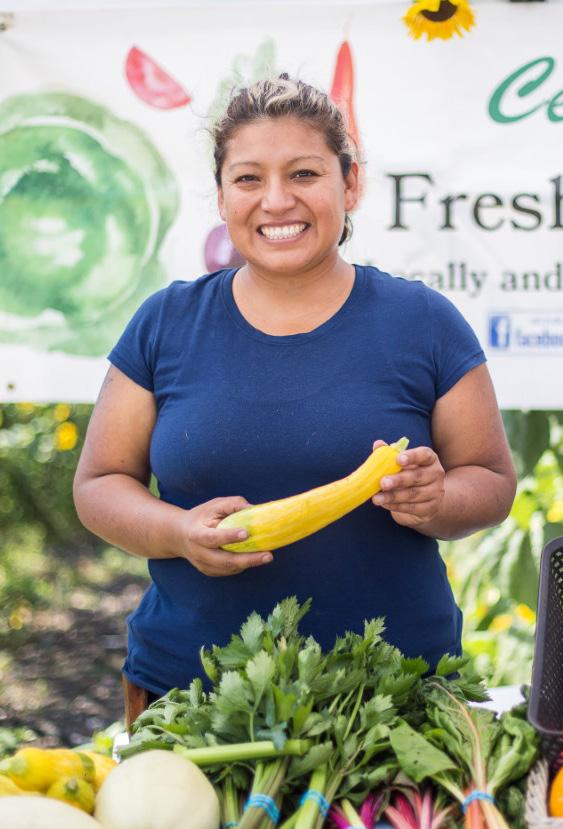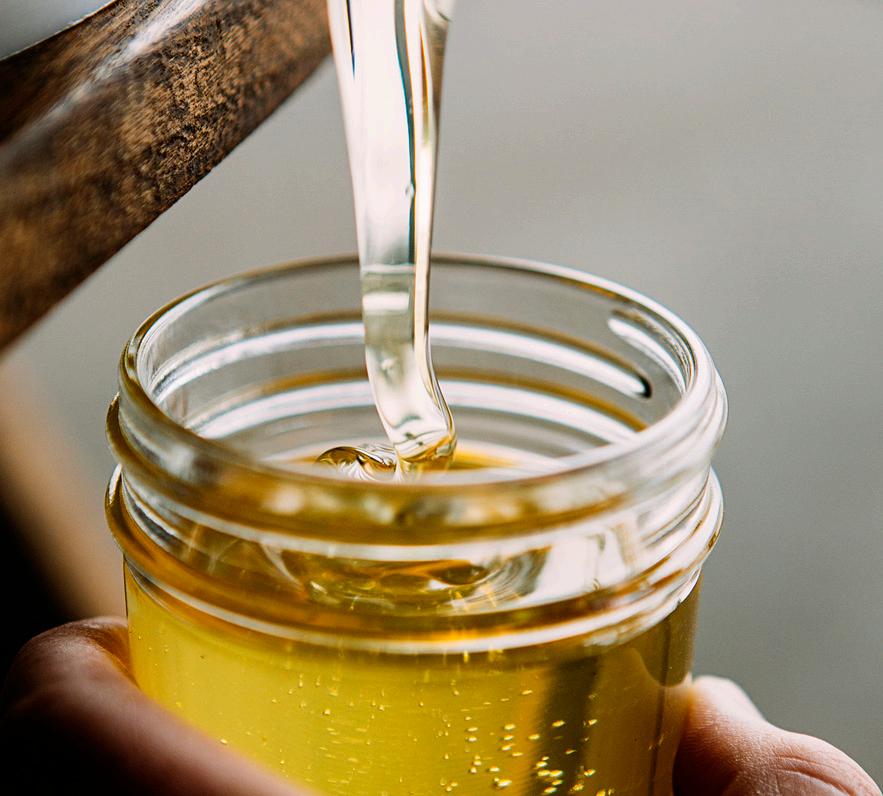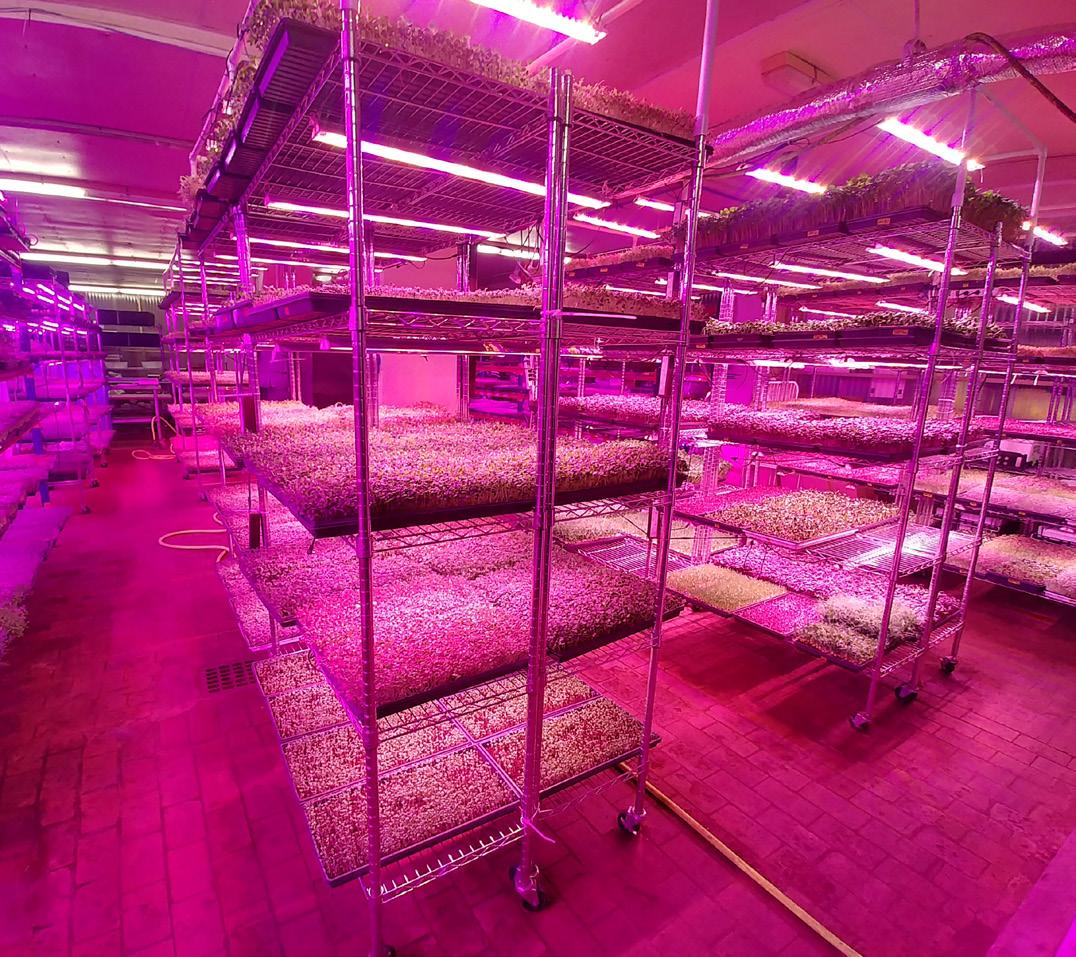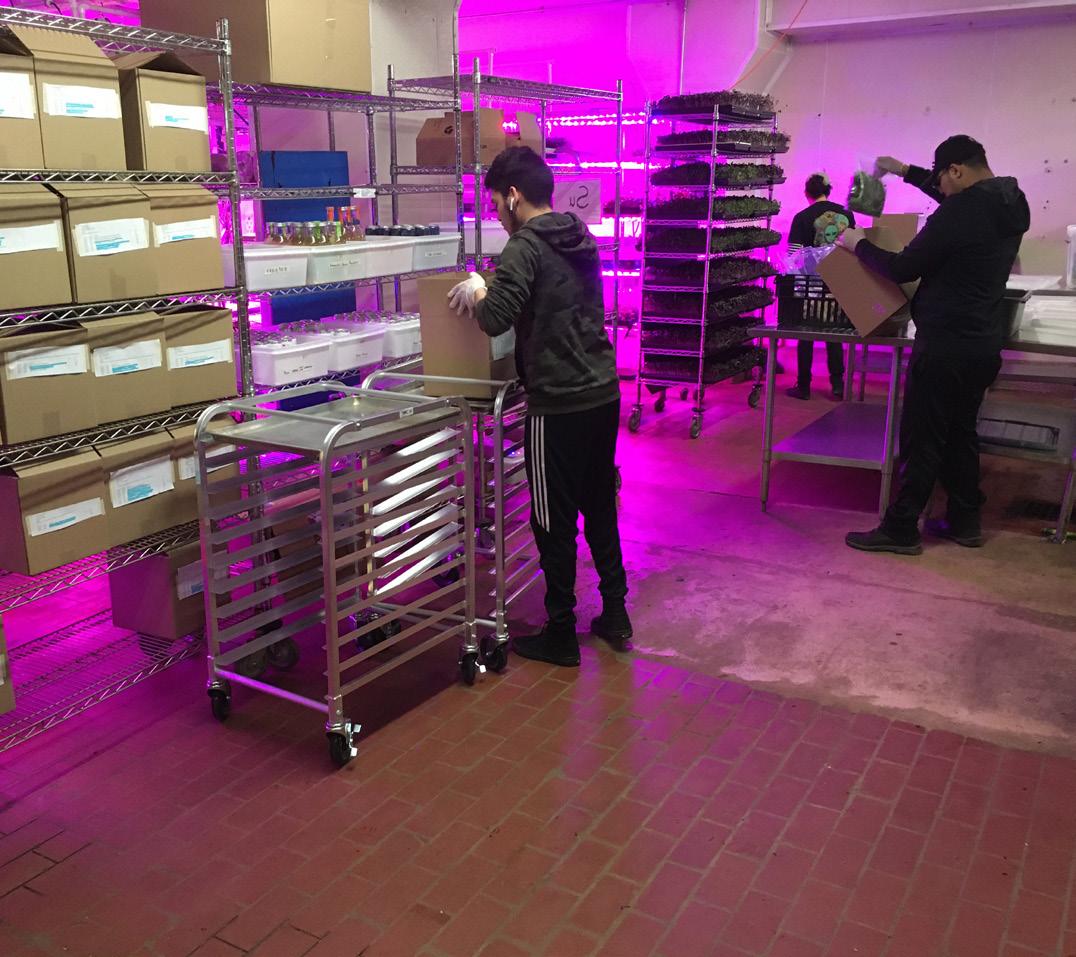
11 minute read
From Farm to Front Door: How local growers strive to survive without farmers' markets
by Rachel Koertner
In the midst of the hardship the world is facing, one nonprofit has found a way to meet many needs of the community - bringing people together, giving them access to fresh food, supporting small businesses, and bringing a bit of joy and normalcy into people’s lives.
Every year Plant Chicago runs a farmers market full of a wide variety of fresh products. However, this nonprofit was stopped in its tracks this year with the stay-at-home order. Markets aren’t able to run normally during quarantine, greatly affecting all of the farmers, vendors, and everyone involved. Staff members at Plant Chicago know how crucial supporting each other is in this time, and how important it is for small businesses to still get the sales they are counting on, so they created an online market. Starting in March they worked hard to correspond with the different markets and vendors to pool resources, see who was able to consider other options like delivery and pick-up, and then put all of the resources into one convenient spot for community members to use.
“There might be some markets that don’t get started at all, and there are some farmers that it is how they make their money, so without the market they are out of luck,” said Executive Director of Plant Chicago Jonathan Pereira. “The online market was really the only option. We knew we had the platform and the audience, and so we can use our megaphone to get the information out to the public.”
Plant Chicago
Plant Chicago is a nonprofit with the mission to cultivate a circular economy. They are based in southwest side of Chicago, and they envision a paradigm shift in production consumption and waste. They have their farmers market every year, but they also do cooking demonstrations and tastings, have a compost drop-off, and have many educational opportunities for all ages. One of the things they are most passionate about is keeping items out of landfills as much as possible.
Two years ago Plant Chicago started the Chicago Farmers' Market Collective as a way to unify the many markets in Chicago. They saw that the city had a lot of farmers' markets, all with the same general mission of providing their residents with locally grown and nutritious food, so they thought all the markets should work together to achieve that goal. About once a month, managers from about 15 different markets meet together to share advice and help each other solve problems to support the city’s local food system, and any market is allowed to join.
Years before starting the Collective, Plant Chicago began working in a well-known building called The Plant. For eight years they were the sole nonprofit in the building. Then this past year they felt they could better fulfill their mission of reaching the whole southwest side of Chicago if they moved, so they transitioned to their new location: the Firehouse. They plan to host many projects in their new building, all of which they hope will bring people together.
“One of the core tenets of our organization is convening diverse programs together and getting people of different backgrounds together in person,” Pereira said. “There are some programs that don’t require being in person, but a lot require people being in the same space.” The inability to have people together has been an obstacle for this organization, but they haven’t let it stop them. In the past two months they have moved many of their programs online. Their education team has launched an online science fair where students can share the experiments they do at home. Additionally, soon they will be offering weekly online workshops for students. They will soon be starting an online educational workshop for adults to teach small businesses how to get more revenue. These are just a few examples of the ways that Plant Chicago is working to get educational programs online to still reach people in this time of quarantine. “We went from everything in person to everything online, and we are still adjusting as an organization,” Pereira said.

A vegan pie created at Pleasant House Pub using produce supplied by Closed Loop.
Closed Loop Farms

Bike A Bee Honey made at The Plant.
Closed Loop Farms
Of course, Plant Chicago isn’t the only business that is going through a tough transition right now. Pereira stresses that this is the time to support local businesses and growers, and for Chicagoans to buy from small businesses as much as possible. “That is really important right now, and this could be a make-or-break moment for many small businesses.” He encourages people to take this time to reflect on their consumption habits and audit the waste that comes in and out of homes. These messages are not new to Plant Chicago, however, and they will continue to be at the core of what Plant Chicago does.
This year, Plant Chicago will be rebuilding their indoor aquaponic farm and shared mycology lab, as well as refurbishing the firehouse to be a new center for the local circular economy in the heart of the Back of the Yards neighborhood. Of course they aren’t sure how long this quarantine will be impacting the business, but they are operating with the assumption that the in-person market will come back. Until then, they will continue to foster the online market. In addition to that, Plant Chicago is starting a pick-up system at their location. The goal is to help the farmers who don’t have the ability to deliver, as well as to provide half-priced produce to LINK (food stamp / debit card) users. This opportunity will be open on Saturdays, and staff members will take orders in advance to set up pick-up times. Community members can go to Plant Chicago’s website to get the contact information for this service which will mainly be for people on the southwest side of Chicago. Pereira anticipates them being a pick-up site for the rest of the growing season, and guesses that some farmers will continue their delivery services even after quarantine is over. One thing he is sure he wants to happen is continuing to keep more information online about how to purchase from farmers even if the buyers cannot attend the market.

Indoor microgreens growing in The Plant.
Closed Loop Farms
However, all of these programs designed to help people could not be done without community support. Plant Chicago could always use donations from community members who want to support their mission, as well as help to get the word out, especially through social media.
Online Opportunities
The Chicago Farmers' Market Collective website has a list of the farmers markets in Chicago that are still running in some way to support the community, and this includes Plant Chicago. They have compiled resources for people to support local vendors through pick-up locations, home delivery or Community Shared Agriculture (CSA) options. Through the links on their website, people can explore Chicago’s various farmers' markets without ever leaving their homes.
Plant Chicago has put together a list of all of their vendors that have been able to transition to some sort of pick-up or delivery option (see page 11). By going to the Plant Chicago website (www.plantchicago. org), customers can click on the links for the businesses and buy directly from their websites. For example, someone looking for baked goods can go to Plant Chicago’s online farmers' market page, then follow that to the link for Butterdough, where they can order a walnut lemon glazed croissant. This will be delivered to their home, or they can have something delivered to a friend or someone in need.
Plant Chicago is not the only organization helping farmers' markets. The Collective’s website lists 61st Street, Andersonville, Glenwood, Green City, Logan Square, Loyola U, McKinley Park and Plant Chicago Farmers' Markets as those who are offering online options in the midst of this quarantine. Each market has individual small businesses that need the support of customers in this time of uncertainty. One example is a farm on Plant Chicago’s listing called Closed Loop Farms.

Closed Loop Farms employees prepare orders for delivery.
Closed Loop Farms
Closed Loop Farms
New to this year’s circuit of farmers market vendors is Closed Loop Farms. The business has been around for years, but this year they are acting as a vendor for community members and doing something different, adapting to reach the community’s needs during the COVID-19 pandemic.
Closed Loop Farms is an urban farm located at The Plant, a re-purposed meatpacking facility comprised of collaborative, small food businesses in the Back of the Yards neighborhood. Over the last three years they have grown from a one-person operation to a staff of eight full-time and four part-time employees.
The thing that makes this business unique is that they used to just sell to restaurants. For years they specialized in growing and selling premium microgreens, herbs and edible flowers to top restaurants throughout the Chicagoland area. The team at Closed Loop Farms is very passionate about microgreens and the convenient way that the vegetable boosts the nutritious value of a meal. In fact, Founder Adam Pollack says that the whole team eats microgreens with most of their meals, and now they want to give community members that same opportunity.
“When the restaurants closed, we knew we had to act fast, and we started putting things in order,” Pollack said. “If people were going to get microgreens, we thought it would make sense to get them the other products as well that they would get at a farmers' market.” That is why they have transitioned to bringing products right to doorsteps this season.
Pollack says that this kind of business change was something they have been wanting to do for a while, but COVID-19 made them do it a little faster.
“I think it’ll be a good long-term move for us, and that it will transform the way people get their produce from farms,” Pollack said. “We want to maintain the direct relationship with our customers, and offer the same convenience as conglomerates, but let people support small businesses.”
Along with supporting small businesses, Closed Loop Farms prioritizes being kind to the environment and the community. For example, more than 99 percent of on-farm waste is composted, which is then used as fertilizer in the outdoor farm. In addition, all unsold perishables are donated to their local food bank, Casa Catalina. Plus, they use completely organic practices and grow all of their microgreens in organic soil, with no pesticide. On top of that, 80 percent of their team lives within five miles of the farm, and they have multiple after school programs, all in hopes of benefiting the community around them.
In order to achieve this goal, they have joined forces with a variety of businesses including Backyard Fresh Farms, Bike-a-Bee, Just Ice, Kombuchade and Mint Creek Farm. Therefore, some of the products that customers can buy through Closed Loop Farms include microgreens, blueberries, cacao fruit soda, a variety of cheeses, Tuanis chocolate bars, coffee, honey, hot sauce, chamomile tea, kombucha and so much more - even deodorant. The staff at Closed Loop Farms believes in the importance of having these fresh products, so they knew they needed to adapt to delivery. This process hasn’t been easy, and there’s a lot to do and learn - they are diving into an entirely new business model. However, they recognized the need for delivery in this time.

Packed orders ready to go at Closed Loop Farms
Closed Loop Farms
“A lot of people, especially those that are older or compromised, don’t want to go in contact with people at grocery stores,” Pollack said. “I think having the security of getting food directly from the people who produced it is a safe way to get food. People know it’s coming, that it’s healthy, that it’s organic, and that the money is going to pay employees, so there's transparency. This is really a matter of food security. Given that global and national supply chains are in question, this represents security because we aren't a supply chain and we are going to continue to produce. Customers have been so appreciative that we can deliver fresh goods every week.”

Trays of microgreens being grown at The Plant.
Closed Loop Farms
In order to fulfill this need, but do it safely, they have implemented multiple preventive measures to make sure that sickness isn’t spread and that the entire delivery process is contactless. The people who deliver are instructed to spray the doorbell with disinfectant before they push it, to wear gloves and to text the customer once they walk away to let them know the food is there. Deliveries happen every Tuesday and Friday in Chicago - in the north suburbs on Fridays only and in the west and south suburbs on Tuesdays only. Also, orders cut off at noon before the day of delivery. There is a $10 delivery fee, with a $25 purchase minimum. There’s free delivery for orders over $200, and free pick-up at The Plant (1400 W. 46th St.) with no minimum total.

A sample of a delivery order.
Closed Loop Farms
Order food and learn more about the farm on their website at closedloop.farm. According to Pollack, they hope to go back to serving restaurants once this is over, but still continue to deliver fresh food to the citizens of Chicago.






